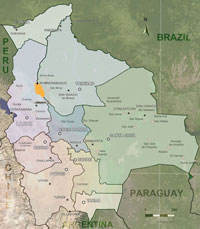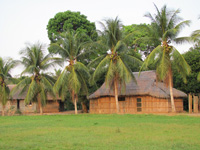 The Pilón Lajas Reserve is found in the provinces of Sud Yungas and Franz Tamayo in the Department of La Paz and the province of Ballivián in the Department of Beni. The reserve is recognized by UNESCO as an area of international interest due to its cultural and natural heritage. Various ecosystems converge here: extremely humid foothill forest, humid montane forest, sub-Andean valleys, evergreen forest and warm valleys (yungas).
The Pilón Lajas Reserve is found in the provinces of Sud Yungas and Franz Tamayo in the Department of La Paz and the province of Ballivián in the Department of Beni. The reserve is recognized by UNESCO as an area of international interest due to its cultural and natural heritage. Various ecosystems converge here: extremely humid foothill forest, humid montane forest, sub-Andean valleys, evergreen forest and warm valleys (yungas).
Area: 400,000 hectares
Climate: between 16 and 26º C
Altitude: from 300 to 2000 masl.
Rainfall: from 1500 to 3500 mm annually
 Hydrography: Beni River, Quiquibey River and Mamoré River
Hydrography: Beni River, Quiquibey River and Mamoré River
Flora: there are more than 3000 species in the reserve, including: cedar, mahogany, jatata palm, a large variety of palm trees, etc.
Fauna: there are approximately 900 species recorded in the area: puma, jaguar, peccary, variety of monkeys and capybara; 700 bird species (47 macaws, variety of toucans, etc.), fish (pacú, surubí, dorado, sábalo, etc.), black caiman, river tortoise, mountain tortoise, toads, frogs, etc.
Population: Chimane, Moseten and Tacana
 Access: you can reach the area via Rurrenabaque from La Paz, either by air or by land. There are a large number of tourist packages available in Rurrenabaque to visit Pilón Lajas either by river or by land.
Access: you can reach the area via Rurrenabaque from La Paz, either by air or by land. There are a large number of tourist packages available in Rurrenabaque to visit Pilón Lajas either by river or by land.
Services: restaurants (Rurrenabaque), hotels (Rurrenabaque), boarding houses (Rurrenabaque), housing (Rurrenabaque), hostals (Rurrenabaque), Mapajo ecotourism agency, etc.
Places to visit: community of San Luís Chico, Charque, Alto Colorado, Gredal, Colorado landslide, Las Cascadas (waterfalls), Beu mountain range, Suapi trail, Sama trail, Valle de la Cascada, Susi range, El Espejo, etc.
Recommendations: bring lightweight clothing, sun block, insect repellent and water, and obtain a yellow fever vaccination prior to travel.
Return to the list


